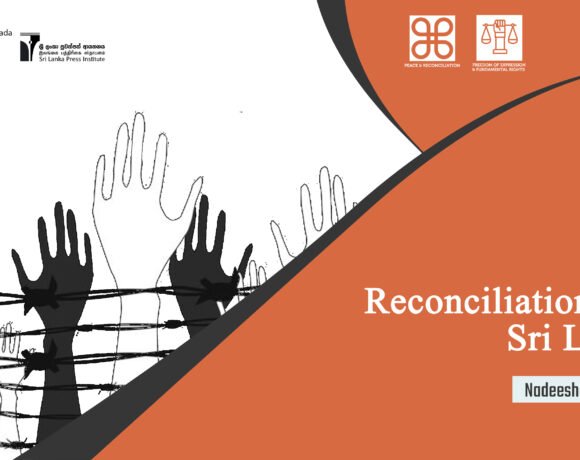
Freedom of Expression and Insulting the Judiciary.
Udeni Perera
This island is named as Democratic Socialist Republic of Sri Lanka. Every citizen of this country is entitled with the basic human rights to live with freedom. Therefore all the citizens have the right to live with freedom according to their desire. But they should make sure that they avoid mistakes committed by themselves.
According to the 14thstatement in the constitution, all the citizens are entitled with freedom of speech and communication as well as freedom of expression. Furthermore, that statement confirms the freedom of peaceful gathering, freedom of company, freedom of establishing and joining trade unions, freedom of art, freedom of following, believing, teaching and spreading a religion in public or in person. It also ensuresthefreedom of enjoying and developing their own culture and language. Citizens are entitled to the freedom of engaging in any legal occupation, trade or entrepreneurship and the freedom of migration and immigration of their choice.
Freedom of expression does not mean expressing anything at any time. The citizens in Sri Lanka should respect the judiciary system in the country. At the same time the citizens do not entertain the right to socialize anything that goes against the law in the country even though they are entitled to the freedom of expression. Such expressions and opinions that go against the law in the country are censored by the judiciary system. Furthermore, all the citizens should be knowledgeable about several points when they express their opinions related to the judiciary in the country.
Even though the constitution has defined the term “judiciary”, it has not clearly defined the term “insulting the judiciary”. According to the study report of the lawyer Jagath Liyanarachchi, “The constitution does not include a judiciary procedure to take actions against those who insult the judiciary system in the country. Therefore, the punishments depend on the emotions of the judges in courts.”
But Sri Lankan constitution includes several factors related to insulting the judiciary. According to the 105th statement in the constitution, the punishment for insulting the judiciary will be decided by the Supreme Court or court of appeal. The punishments can be either one from fining or imprisonment or both of these. Any action that damages the honour of the judiciary, insulting the judiciary by any mean in front of the citizens, passing sarcastic comments towards judiciary, rejecting to accept a court order, challenging court orders, disrespectful behaviour at the courts, any behaviour or action to insult the judiciary or lawyers as a whole are considered as the actions of insulting the judiciary.
The punishments that are entitled for insulting the judiciary are included in the 2nd Judicial Organization Act in 1978.Therefore, according to its 18th statement, the convict who insulted the judiciary is entitled to either a severe/non-severe imprisonment for five years or fine of Rs:5000/- or both these punishments. The decision of the punishment is up to the Supreme Court. According to the 55th statement, insulting a district court is entitled to either a severe/non- severe imprisonment for 2 years or a fine of Rs2500/- or both these punishments. The decision will be made by the district court. As mentioned in the same statement, if a convict has insulted a magistrate court or the primary court, the convict is entitled to either an imprisonment of 18 months or a fine of Rs:1000/- or both these punishments. The power to decide the punishment is with the magistrate court or the primary court.
Additionally, breaking a promise given to the court, going against a judgement or a court order, oral or written disturbance inside the court, any activity to demean the power of the court, any type of disturbance to the security and independence of the court are considered as activities of insulting the judiciary.
However, criticisms of the court or judicial proceedings after a proper study, criticisms of delayed trials, criticisms for the amendments of the judiciary system, complaints against a judge are not considered as activities that insult the judiciary.
Once, a person called Tony Emmanuel was made guilty for speaking aloud in the court premises during a case against a judge. He was entitled for an imprisonment of 1 year. He has also been tortured at the prison after being imprisoned. This court case has grabbed the attention of the international authorities too. Thereafter, the Supreme Court ordered the authority at the prison to pay compensation to Tony Emmanuel for torturing him at the prison.
The lawyer Jagath Liyanarachchi mentions that the bill which was prepared in 2008 by the Sri Lanka Judiciary Commission regarding insulting the judiciary has not been given the approval yet.
There are convicts who have been charged for insulting the judiciary. Mr: Ranjan Ramanayaka was charged for making a statement about a panel of judges which examined a petition of fundamental rights presented by the former president related the dissolution of the parliament in 2019. Mr:Ranjan Ramanayaka has been convicted for insulting the judiciary through his statement. When a case is being examined at the court, nobody can make any comments that are beneficial for the convict in front of media. The retired major Ajith Prasanna was also convicted for the same type of activity. The former minister S.B Dissanayake had to undergo a severe imprisonment for two years for insulting the judiciary. Thus, the above mentioned incidents can be provided to prove that insulting the judiciary is a punishable offence according to the Sri Lankan constitution.








